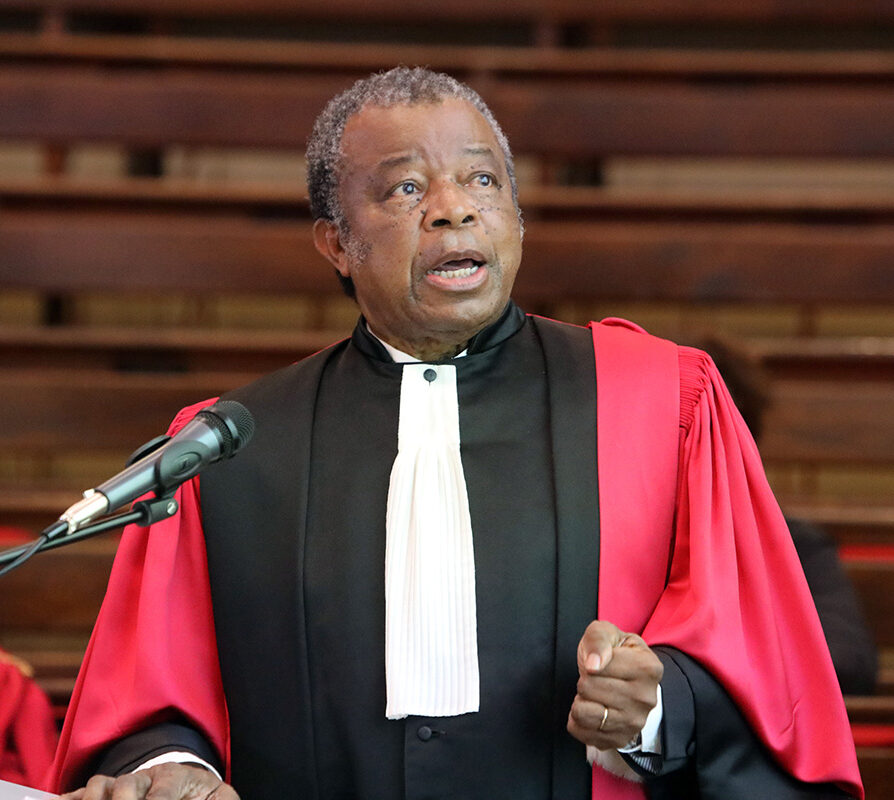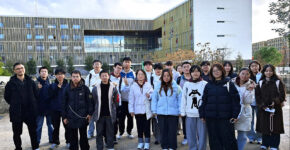Jean-Jacques Muyembe, stemming the tide of Ebola
It was on the recommendation of Montpellier professor Eric Delaporte, director of the TransVIHMI international joint unit, that the University of Montpellier awarded anhonorary doctorateto Jean-Jacques Muyembe on December 9.

Co-discoverer of the Ebola virus and director of the pioneering National Institute for Biomedical Research in Kinshasa, this Congolese virologist dedicated his life to fighting epidemics. Following his discovery, his work led to the development of the first ever treatment for the Ebola Zaire virus.
"Jean-Jacques Muyembe's work is above all a long-term endeavor at a time when no one was paying attention to this virus, which was initially responsible only for limited epidemics in the rainforest," says Eric Delaporte, professor of infectious diseases at the University Hospital and University of Montpellier and director of TransVIHMI. For more than 20 years now, this joint international unit attached to the UM, IRD, and Inserm has been collaborating with the National Institute for Biomedical Research in Kinshasa, headed by Professor Muyembe.
On December 9, the two scientists did not shake hands warmly on African soil, but under the moldings of the Faculty of Medicine in Montpellier, where Philippe Augé, president of the University, came to award Jean-Jacques Muyembe an honorary doctorate. In the anatomy lecture hall where the ceremony is taking place, a small crowd has already gathered to hear the traditional lecture given by the recipient. Today's topic: "From the discovery of the Ebola virus to its control."
Discovery of a new virus
It is difficult to smile, let alone laugh, when discussing a disease as deadly as Ebola. And yet, it is with humor and a simplicity that could be described as extraordinary, given the man's impressive career, that the Congolese professor recounts the grim history of this virus, which he co-discovered more than 40 years ago. The story begins in September 1976 in a country still known as Zaire at the time. Jean-Jacques Muyembe, who graduated fromLovanium University (DRC) in 1969 andthe University of Louvain in 1973, was sent on a mission to the small village of Yambuku to investigate a mysterious disease affecting the villagers. "Even the Belgian nuns at the Catholic mission hospital were victims," the doctor points out. Neither antimalarial drugs nor antibiotics had any effect on these patients, most of whom died.
While the authorities suspected thyroid fever, the doctor took blood samples from the patients. "My fingers were often stained with blood, but fortunately I had the reflex to wash my hands immediately with soap, otherwise I wouldn't be here with you today. " When three nurses and two nuns evacuated to Kinshasa also died, Jean-Jacques Muyembe decided to send his samples tothe Institute of Tropical Medicine in Antwerp. There, Professor Peter Piot confirmed the emergence of a new virus. It was named Ebola, after the river that flows near the village where it first appeared.
Initial control measures
In 1976, the two strains of the virus, Ebola Zaire and Ebola Sudan, which broke out in June in the country of the same name, claimed 318 victims, 280 of whom died, representing a fatality rate of 88%. While these first Ebola epidemics were dying out, AIDS continued to spread in Africa. To combat this new scourge and work on emerging diseases, Jean-Jacques Muyembe, who is also a professor of microbiology at the Faculty of Medicine of the University of Kinshasa, dreamed of establishing a research institute modeled on the Pasteur Institute. This dream became a reality in 1984 with the creation of the National Institute for Biomedical Research of the Democratic Republic of Congo, inaugurated at the time by François Mitterrand and DRC Prime Minister Leon Kengo. "The Congolese have developed this center into a true benchmark. Today, there are more centers of this scale in Africa, but the INRB was a pioneer as an autonomous national center of international standing," recalls Eric Delaporte,who at the time was also working on HIV, but in Gabon.
After 19 years of silence, Ebola reappeared in April 1995 in Kikwit, a city of 400,000 inhabitants located 500 km south of Kinshasa. Jean-Jacques Muyembe was then appointed national coordinator of the response to the epidemic. He drew up a more accurate virological profile of Ebola and highlighted the epidemiological aspects of the disease, in particular the amplifying role of hospitals and funeral rites. He became a pioneer in the implementation of epidemic control measures such as the "Ebola handshake,"which 25 years later would inspire Western public health policies during the SARS-CoV-2 epidemic. He also attempted the first serotherapy by treating eight patients with the blood of Ebola survivors: seven survived. The epidemic died out after affecting 317 people and causing the deaths of 250 of them.
On the trail of AIDS
At the end of the 1990s, Jean-Jacques Muyembe took over as director of INRB and continued the drive to raise its international profile. Meanwhile, Eric Delaporte and Martine Peeters, a virologist at TransVIHMI, continued their investigative work in Africa to trace the origin of HIV and track the spread of the epidemic. "Jean-Jacques was also conducting research on HIV and wanted to develop collaborations. That's how we started training students together, including Steve Ahuka-Mundeke, now head of the virology unit at INRB, and Placide Mbala, head of the molecular biology unit," continues the French infectious disease specialist.
TransVIHMI and INRB will thus conduct numerous collaborative projects on HIV genetic diversity in Kinshasa, confirming the Congolese capital as the starting point of the global AIDS epidemic. They will also work on the diversity of simian retroviruses in order to identify new viruses and monitor the emergence of resistance to antiretroviral drugs used to treat HIV. The two teams continue to work hand in hand on numerous projects, including ARIACOV, which aims to monitor the dynamics of SARS-CoV-2 infection in Africa.
The return of Ebola
Between 2000 and 2020, numerous Ebola outbreaks continued to occur on the African continent. While most of them were quickly brought under control, a major epidemic broke out in Guinea in 2013 and rapidly spread to other West African countries. A few isolated cases were even reported in Europe and the United States. The epidemic lasted two years and caused between 15,000 and 20,000 deaths. The transfusion of blood from survivors, which had been successfully tested in 1995, proved to be ineffective during this epidemic. However, Professor Muyembe did not abandon this avenue of research and, with the support of an American team, continued his research into monoclonal antibodies from the blood of a survivor.
In 2018, two new Ebola epidemics broke out in the DRC. Despite the civil war, which significantly worsened the situation, research enabled better management of the epidemic: "The molecule developed by Jean-Jacques Muyembe and named Ebanga made it possible to validate the first curative treatment for Ebola Zaire. At the same time, it also contributed to the development and evaluation of a vaccine, which is now in operational use," explains Eric Delaporte. Collaboration with TransVIHMI also led to the identification of the viral strain responsible for the epidemic, enabling better diagnosis and monitoring of the epidemic through contact tracing using new molecular biology techniques.
International recognition
A leading scientific and political figure in his country thanks to his role in public health management, Jean-Jacques Muyembe now enjoys an international reputation. He is the winner of France's Prix Mérieux from the Institut de France, the prestigious Hideyo Noguchi Africa Prize, which was awarded to him in Tokyo in 2019, and an honorary doctorate from Harvard. Nature magazine ranked him among the ten most influential scientists of 2018-2019. "At the time of Covid, he was considered by Time magazine to be one of the 100 most prominent figures, and despite all this, he has always remained remarkably down-to-earth. He is someone who refuses to take himself seriously and who handles irony with great finesse," continues Eric Delaporte.
Following pediatrician Chipepo Kankasa (Zambia), media specialist Tawana Kupe (South Africa), and gynecologist and Nobel Peace Prize winner Denis Mukwege (DRC), the University of Montpellier reaffirms, through its honorary doctors, its desire to continue and develop its close collaborations with African research excellence and to support it by all available means. With this objective in mind, the Prisme DRC agreement for an "international research platform on global health in the Democratic Republic of Congo" was signed at the end of the ceremony in the presence of Jean-Jacques Muyembe, director of the INRB, Body Ilonga, Secretary General of the Ministry of Public Health of the Democratic Republic of Congo, Yazdan Yazdanpanah, Director of ANRS-Emerging Infectious Diseases, Yves Martin-Prével, Director of the IRD Health Department, and Philippe Augé, President of the University of Montpellier.
